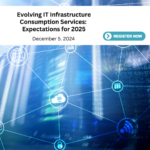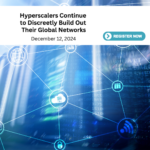Hybrid AI: Lenovo Builds a Portfolio Ready to Address the Confluence of Personal, Enterprise and Public Data
Lenovo Outlines Its Vision for Hybrid AI
Lenovo CEO Yuanqing Yang, better known as YY, opened up the company’s 2024 Tech World event by discussing Lenovo’s stance on what it calls “hybrid AI,” a vision not dissimilar to hybrid cloud.
Hybrid AI is the ability to leverage both private (personal or enterprise) and public foundational models together to drive action. YY sees hybrid AI as the path forward for both consumer and enterprise users, with AI agents serving as the vector for combining these multiple data sources and connecting knowledge with specific tasks. AI agents will know their users by integrating disparate data into unified frameworks, will understand their users by creating models of a person or enterprise, and will work for their users by putting this knowledge into action.
The incoming era of agentic AI will require multiple agents work together to make critical connections across public and private data sets. During the Tech World keynote, Lenovo executives demonstrated a handful of capabilities of personal AI agents, from helping students study more effectively for exams to understanding the context of a consumer’s morning routine and ordering their favorite coffee from their usual coffee shop. These types of tasks require the ingestion, understanding and integration of user data across multiple applications.
While the discussion around consumer AI was focused on devices, Lenovo’s Enterprise AI showcase largely highlighted its IT infrastructure and services businesses. Core to the hybrid AI theme was the announcement of Hybrid AI Advantage with NVIDIA. Enabled by Lenovo’s full-stack portfolio and new Lenovo AI Library, the joint solution framework highlights how Lenovo believes its Lenovo Hybrid AI Advantage will accelerate enterprises’ AI adoption. This announcement formalizes Lenovo in competition with similar NVIDIA-based joint solution portfolios from Dell Technologies and Hewlett Packard Enterprise (HPE).
In contrast to these large-scale high-performance computing (HPC) systems, Lenovo arguably will have equal or greater success through its AI-centric edge business, where Lenovo has a track record of deploying retail, manufacturing and smart city use cases. Multiple server vendors’ AI stories center on their massive 8-GPU AI systems, but Lenovo points out that for many companies, AI will be executed on far smaller and more affordable systems, some with no GPU at all. This strategy plays directly into Lenovo’s “AI for all” mantra.
Underneath the enthusiasm for hybrid AI, Lenovo’s mission remains unchanged: It is driving transformation to become a technology leader in global devices, infrastructure solutions and services worldwide. Lenovo positions itself as having an end-to-end technology portfolio, a user-centered approach and an immense emphasis on open innovation. The company offers its customers choices thanks to its partnerships across semiconductor, AI platforms and ISVs; and it leverages its Solutions and Services Group (SSG) to accelerate solution development between its own portfolio and partner ecosystem.
Lenovo Develops Proprietary AI Features to Differentiate Its IDG Portfolio
Overall PC demand decreased over the past several quarters due to lengthening PC life cycles and the lingering effects of post-pandemic market saturation. However, during the pandemic the total addressable market for PCs increased robustly as the number of PCs per household jumped, driven by both work- and learn-from-home initiatives around the world.
As such, with these pandemic-bought machines aging, the next major PC refresh cycle is on the horizon and is expected to drive a material rebound in the market, supported by the upcoming end of Windows 10 support and mounting interest around AI PCs.
However, the lack of killer applications leveraging the neural processing unit (NPU) has throttled AI PC adoption thus far. At GIAC Lenovo emphasized that it expects new AI PC killer use cases and applications will come in 2025 and 2026, noting that there are already over 100 independent software vendors developing applications leveraging the NPU.
Lenovo had also recently announced AI PC Fast Start, an AI-centered advisory and deployment service that helps organizations transition to AI-ready devices and quickly unlock the potential of AI PCs.
Lenovo Announces Aura Edition AI PCs Ahead of the Next Major PC Refresh Cycle
To prepare for this refresh and capitalize on the market’s interest in AI and generative AI (GenAI), Lenovo unveiled a series of new AI PCs, including the company’s Aura Edition AI PCs, which the company developed in deep collaboration with Intel and includes three levels of “Smart” features to enhance the user experience.
The Smart Modes feature allows Aura Edition PCs to intelligently adapt to users’ workloads and environments through five submodes, including Shield Mode and Collaboration Mode, which enhance user privacy and optimize video from integrated PC cameras, respectively. The Smart Care feature integrates natural language processing capabilities to drive an enhanced user support experience, and the Smart Share feature allows for cross-device image sharing, supporting smartphones on both Android and iOS platforms.
Lenovo Plans to Leverage Its AI Now Agent to Drive Differentiation in the Market
Over the last decade the Windows PC market has become increasingly commoditized as all OEMs across the industry built machines based on the same PC silicon and operating system, resulting in a lack of material differentiation. However, the rise of AI PCs presents a new opportunity, and Lenovo is working to set itself apart from its peers by working with Meta to develop and integrate an on-device AI agent, dubbed AI Now, through a deepening of their partner engagement.
While Microsoft Copilot+ offers a series of GenAI features and experiences for Windows 11 machines leveraging several of Microsoft’s small language models, at GIAC Lenovo Executive Vice President and President of IDG Luca Rossi noted that not all Copilot+ functions are run natively on the device, with certain queries going to the cloud. In contrast, Lenovo AI Now leverages a local large language model to drive new capabilities that complement Copilot+’s feature set.
With significant support from Meta, Lenovo’s research team worked extensively to fine-tune the local large language model behind AI Now using Meta’s Llama 3. Through AI Now users can interact in real time with their device’s personal knowledge base, all without relying on cloud computing, providing enhanced data privacy and enabling GenAI features without internet connectivity.
AI Now’s capabilities include document management, meeting summarization, device control and content generation, with the AI assistant supporting natural language interaction. Additionally, it is worth reiterating that Lenovo sees AI Now complementing Copilot+ rather than replacing it, as the company does not want its AI PC agent to compete with other cloud-based or cloud-leveraging alternatives.
Lenovo Bets Big on MBG and moto ai
IDG is comprised of two business units: PCs and Smart Devices (PCSD) and Mobile Business Group (MBG). While the majority of IDG’s investment is focused on PCSD, the larger of the two business units, Lenovo remains committed to expanding its MBG business, which includes Motorola Mobility, to grow its global market share and increase the premium mix of its overall mobile portfolio.
Similar to its strategy in the AI PC space, Lenovo MBG continues to invest in the development and integration of AI features within its smartphone lineup through moto ai. While many of the company’s moto ai features showcased at Tech World are in proof of concept or beta stages, Lenovo made clear its plans to bring customized user experiences to market in the near term. New moto ai features include prompts and commands like “Catch me up,” which summarizes personal communications, and “Remember this,” which, when initiated, captures live moments and on-screen information while also providing AI-generated insights.
Additionally, Lenovo demonstrated the capabilities of its large action model, which allows Motorola devices to learn from users’ behaviors to offer increasingly personalized responses and translate natural language prompts into actions that can be executed automatically on behalf of the user.
Further, Lenovo provided an update on how the company plans to bolster the capabilities of its Smart Connect software solution, launched in February, to enable multidevice experiences across Lenovo’s portfolio of PCs, tablets and smartphones. The integration of new AI features with Smart Connect will enable users to not only transfer personal data across their connected devices but also benefit from cross-device searches and smart actions, allowing them to activate moto ai features directly from their PC using moto ai prompts and commands.
Perhaps most noteworthy, Smart Connect supports Lenovo’s hybrid AI strategy by fully integrating device ecosystems, allowing users to instruct their Motorola devices to carry out a complex AI task that cannot be performed locally on the device. Instead, Smart Connect uses a connected AI-enabled device, such as a Lenovo AI PC, to execute the task and return the results to the users’ smartphone.
Lenovo Uses One Lenovo Strategy to Bring Enterprise AI to Fruition
Enterprise AI Solutions Highlight ISG and SSG Integration
While Lenovo operates three distinct groups for devices, infrastructure and services, its enterprise AI solutions pull from expertise across the three businesses. This is particularly evident in the ISG and SSG space with the launch of Lenovo AI Fast Start services and Lenovo Hybrid AI Advantage with NVIDIA.
Lenovo’s AI Fast Start professional services help customers identify AI use cases and begin generating value within 90 days. While this may seem like a lofty goal, particularly as the enterprise market struggles to identify and best deploy AI, Lenovo highlighted two examples of this service in action. SAP used AI Fast Start to build an interactive AI avatar for one of its newest experience centers. Formula One also used the service to deploy an AI-based solution that provides a more immersive viewer experience by pulling video from numerous video feeds, enhancing the content and delivering it to the user faster than through manual video management method.
While these use cases are examples of tangible needs that can be met using AI, other use cases are not as evident in the enterprise market. Lenovo has also built an AI advisory practice that identifies ways AI can create value for a business and develop an adoption road map leveraging Lenovo’s AI library of use cases. By using the term “library” to describe its collection of AI use cases, Lenovo is intentionally conveying the impression that it offers specific use cases for everyone.
In TBR’s view, this provides some subtle differences from the one-size-fits-most messaging around AI use cases coming from most of Lenovo’s peers and ecosystem players. In addition, TBR notes that Lenovo intends to fully root its AI advisory capability into its technology, rather than taking a McKinsey-like approach to business consulting, playing to Lenovo’s services strengths.
Lenovo Deepens Its Relationship with NVIDIA to Drive Enterprise AI Adoption
Lenovo Hybrid AI Advantage with NVIDIA is first and foremost a collaboration that marries Lenovo’s infrastructure and services portfolios with the NVIDIA AI Enterprise software platform, NVIDIA accelerators and NVIDIA networking solutions. While other companies have collaborated with NVIDIA in the enterprise market, including Dell Technologies with its Dell AI Factory with NVIDIA and HPE with its NVIDIA AI Computing by HPE, Lenovo intends to differentiate itself through its library of horizontal and vertical-specific accelerators, which will help customers build solutions more quickly.
Lenovo Hybrid AI Advantage with NVIDIA can be paired with Lenovo AI Advisory and Lenovo AI Fast Start services, Lenovo TruScale GPUaaS, or ISV offerings from Lenovo’s AI Innovators Program.
Lenovo is also using its 70,000-employee base as the test bed for AI use cases being brought to market. Ken Wong, executive vice president and president, SSG, notes that SSG’s biggest customer is Lenovo itself. For example, the company has built generative AI-based solutions to generate marketing content and to create customer service agents for its customer support centers.
Lenovo Highlights Engineering Distinctions in Its Wide-ranging AI Server Lineup
Sustainability is a difficult topic to broach when it comes to large-scale AI systems, which consume increasing amounts of electricity and generate more heat with each new generation of AI accelerators. Lenovo provides a compelling approach with its sixth generation of Neptune liquid cooling, which is integrated into its ThinkSystem SC750 and SC777 servers.
Unlike other water cooled systems, Lenovo’s liquid cooling uses conductive copper piping instead of PVC and is able to cool the systems with warm water instead of prechilled water, which consumes additional energy. Compared to air cooled server systems, Lenovo claims that Neptune can reduce energy consumption for server fans and data center air conditioners by 40%. Lenovo also pairs its in-house liquid cooling design expertise with its data center design and planning, implementation and management services to facilitate liquid cooling technology adoption for AI workloads.
Of the major server OEMs, Lenovo is the quickest to point out that not all enterprise AI use cases require high-performance computing. Lenovo’s edge computing business, which is now integrated with its AI business, features its ThinkEdge server portfolio including multiple small form factor servers that operate in edge environments. These servers are the foundation for many of the AI use cases featured in the 165-plus ISV solutions built through Lenovo’s AI Innovators Program.
Responsible AI Serves as Lenovo’s Guiding Principle
Lenovo’s company vision of hybrid AI, in which personal, enterprise and public data sets are used to inform AI agents, is the natural evolution of AI technology but is not without risks around security, privacy and sustainability.
In response to these risks, Lenovo has proactively implemented its own AI governance organization to create AI policies and establish trust among its employees, customers and partners. Lenovo has combined its chief security officer and chief AI officer positions into one role under Doug Fisher, based on the company’s belief that security, privacy and ethics are central to designing AI solutions.
Behind the Scenes, Lenovo Is Honing Its Strategy Execution
Following the pandemic and a related multiquarter slump in PC demand that impacted top-line revenue and profitability, Lenovo has underscored its strategy to diversify revenue away from PC, which made up about 74% of total revenue in 2021.
While Lenovo has made progress on this goal to some extent, as ISG and SSG have both experienced revenue growth, the company acknowledges it needs to make changes across its portfolio and go-to-market strategies to further accelerate revenue growth.
Lenovo 360 Continues to Target Growth Through Partner Channel
An effective channel strategy is critical to executing on Lenovo’s broad growth initiatives, particularly those around driving ISG hardware to profitable growth. The company’s Lenovo 360 partner framework has simplified the partner process by drastically reducing the number of partner programs and incentive structures, streamlining certification processes, and creating a digital hub that supports demand-generation activities and helps partners track their deal pipeline and sales performance.
In tandem with transforming partner engagement, Lenovo is simplifying the ISG product portfolio to focus on the hardware configurations that comprise the most sales volume. This strategy is one of the key ways Lenovo plans to trim costs within its operations and make its portfolio easier for channel partners to sell. Additionally, a simplified infrastructure portfolio will also help Lenovo more easily maintain healthy channel inventory levels.
Lenovo acknowledges that the landscape of resellers is evolving from traditional value-added resellers to a services-led approach. As such, the company is evolving its partner framework to better engage with a broader set of ecosystem players, including managed services providers and global systems integrators, that are increasingly relevant partners in complex, multivendor solutions.
Lenovo Will Expand into Tangential Markets Where It Can Tap into Existing Strengths
Lenovo wants to capitalize on new markets, including the auto industry where technology is shifting from using multiple distributed computing resources throughout vehicles to more centralized computing, specifically around infotainment and autonomous driving systems.
Yong Rui, Lenovo’s former CTO, has been appointed to lead the company’s newly formed Emerging Technology Group (ETG), which will spearhead the expansion into in-vehicle computing as well as other emerging tech areas.
Lenovo feels its strengths in hardware design and manufacturing will help it expand into a brand-new market with an entirely different set of competitors. Through this expansion, Lenovo will remain true to its own DNA, focusing specifically on compute and leaving other aspects such as software, algorithms and vehicle manufacturing to ecosystem partners.
Lenovo Is Investing in Brand Recognition and Perception
Lenovo is investing in brand recognition through major sports sponsorships. At Tech World, Lenovo announced an expansion of its existing sponsorship of Formula One, which will include Lenovo’s subsidiary Motorola becoming the global smartphone partner for Formula One.
Further, Lenovo announced a partnership with FIFA to become the technology partner for the FIFA World Cup 2026 and the FIFA Women’s World Cup 2027. These investments will help Lenovo drive brand recognition and expand into key growth markets including premium PC, premium smartphone, IT infrastructure and related solutions and services.

 Annatodica, Getty Images via Canva Pro
Annatodica, Getty Images via Canva Pro Technology Business Research, Inc.
Technology Business Research, Inc. Technology Business Research, Inc.
Technology Business Research, Inc.